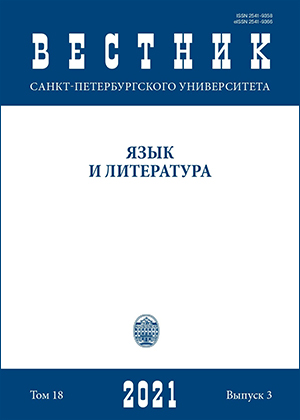The name of a person in official communication of the 18th century (features of naming Pugachev in the documents of the 1770s)
DOI:
https://doi.org/10.21638/spbu09.2021.310Abstract
On the example of naming Pugachev in various documents of the 1770s, where he played various social roles — the interrogated, imposter tzar, a person under investigation, the accused — the article examines the dependence of the form of officially naming a person based on his position in society, the type of document and the place of the name in the documentary text. Official anthroponyms of the 18th century began to oppose the forms of naming a person in unofficial communication. This process demonstrates the gradual alienation of official communication from live speech. The correct naming of a person in different types of documents required special skill and training and was a sign of inclusion in the official communication. The article analyzes changes in naming Pugachev in documents related to different stages of Pugachev’s Rebellion, and it is concluded that gradually in the documents of rebels, when choosing the forms of his naming, the number of deviations from the established official forms of anthroponyms decreases. The analysis of the documents related to the investigation of Pugachev reveals a number of serious deviations in his naming, which indicated that the authorities considered Pugachev’s crime as one of particular severity and they deprived Pugachev of the usual forms of official naming. The investigation documents usually used the contemptuous diminutive form of the name Emel’ka or the evaluative noun villain.
Keywords:
Russian language of the XVIII century, history of Russian official language,, naming, anthroponymic model, Emel’ian Pugachev
Downloads
References
Коркина 2015 — Коркина Т. Д. Формула рукоприкладства в кеврольских таможенных книгах первой четверти XVIII века. Вестник Ленинградского государственного университета им. А. С. Пушкина. 2015, 1 (4): 99–107.
Коркина 2018 — Коркина Т. Д. Памятники региональной деловой письменности первой четверти XVIII века как лингвистический источник (на материале кеврольских таможенных книг). Дис. … канд. филол. наук. СПб., 2018. 252 с.
Неволина 2011 — Неволина А. М. История антропонимов в разных типах тотемской деловой письменности конца XVI—XVII в. Автореферат дис. … канд. филол. наук. Вологда, 2011. 21 с.
Русанова 2015 — Русанова С. В. Промемория в региональном делопроизводстве XVIII в.: функциональная направленность и жанровая специфика. Вестник Московского университета. Сер. 9: Филология. 2015, (2): 153–164.
Садова, Руднев 2018 – Садова Т. С., Руднев Д. В. Метафора государства и государственный язык. В кн.: Языковая норма. Виды и проблемы: материалы V Международного педагогического форума (Сочи, 3–4 декабря 2018 г.). СПб.: Изд-во Рос. гос. пед. ун-та им. А. И. Герцена, 2018. С. 174–182.
Смольников 1996 — Смольников С. Н. Антропонимическая система Верхнего Подвинья в XVI в. (на материале памятников местной деловой письменности). Автореф. дис. … канд. филол. наук. Вологда, 1996. 22 с.
Унбегаун 1971 — Унбегаун Б. О. Отчества на -ич и их отношение к русским фамилиям. В кн.: Исследования по славянскому славяноведению. Сборник в честь шестидесятилетия профессора С. Б. Бернштейна. М.: Наука, 1971. С. 280–286.
Формановская 2005 — Формановская Н. И. Культура общения и речевой этикет. М.: Икар, 2005. 250 с.
Коркина 2015 — Korkina T. D. Structural forms of the signatures found in Kevrola Customs books of the first quarter of the18th century. Vestnik Leningradskogo gosudarstvennogo universiteta im. A. S. Pushkina. 2015, 1 (4): 99–107. (In Russian)
Коркина 2018 — Korkina T. D. The monuments of the regional business writing of the first quarter of the 18th century as a linguistic source (based on Kevrol customs books). Thesis for PhDin Philological Sciences. St. Petersburg, 2018. 252 p. (In Russian)
Неволина 2011 — Nevolina A. M. The history of anthroponyms in different types of Totem business writing at the end of 16–17th centuries. Abstract of the Thesis for PhDin Philological Sciences. Vologda, 2011. 21 p. (In Russian)
Русанова 2015 — Rusanova S. V. Pro-memoria in the 18 century regional business documentation: its functional orientation and genre specifics. In: Vestnik Moskovskogo universiteta. Seriia 9: Filologiia. 2015, (2): 153–164. (In Russian)
Садова, Руднев 2018 – Sadova T. S., Rudnev D. V. State metaphor and state language. In: Iazykovaia norma. Vidy i problemy: materialy V Mezhdunarodnogo pedagogicheskogo foruma (Sochi, 3–4 Dec. 2018). St. Petersburg: Rossiiskii gosudarstvennyi pedagogicheskii universitet im. A. I. GertsenaPubl., 2018. P. 174–182. (In Russian)
Смольников 1996 — Smol'nikov S. N. Anthroponymic system of Verkhnee Podvinie in the 18th century (based on monuments of local business writing). Abstract of the Thesis for PhD in Philological Sciences. Vologda, 1996. 22 p. (In Russian)
Унбегаун 1971 — Unbegaun B. O. Patronymic names with endings -ich and their relationship with Russian surnames. In: Issledovaniia po slavianskomu slavianovedeniiu. Sbornik v chest' shestidesiatiletiia professora S. B. Bernshteina. Moscow: Nauka Publ.,1971. P. 280–286. (In Russian)
Формановская 2005 — Formanovskaia N. I. Communication culture and speech atiquette. Moscow: Ikar Publ., 2005. 250 p. (In Russian)
Downloads
Published
How to Cite
Issue
Section
License
Articles of "Vestnik of Saint Petersburg University. Language and Literature" are open access distributed under the terms of the License Agreement with Saint Petersburg State University, which permits to the authors unrestricted distribution and self-archiving free of charge.






